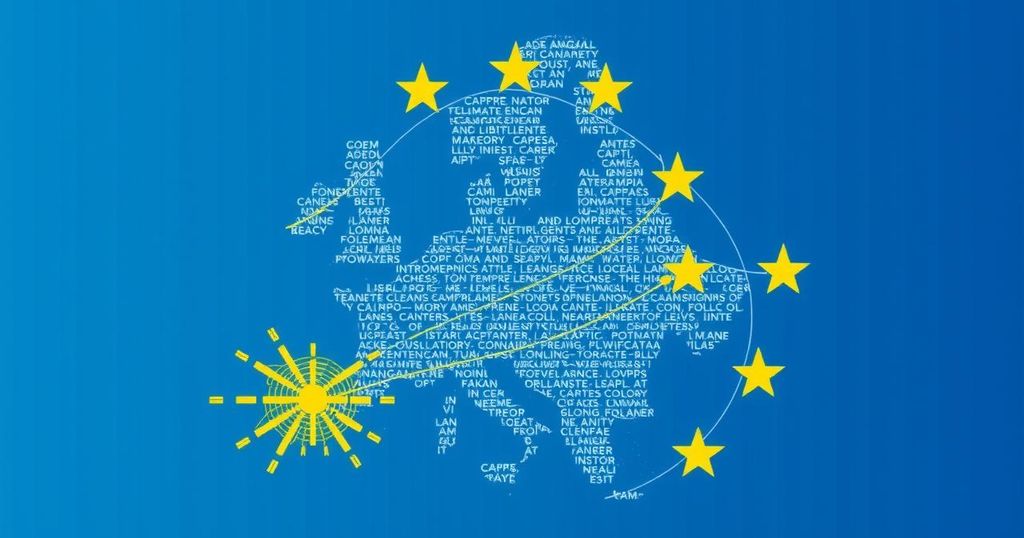Global news
AFP, ASIA, AZERBAIJAN, BAKU, DIEGO PACHECO, DONALD TRUMP, ENVIRONMENTAL POLICY, EU, EUROPE, EUROPEAN COMMISSION, EUROPEAN UNION, GERMANY, GREEN HYDROGEN, IGNACIO ARRONIZ, INTERNATIONAL RELATIONS, NETHERLANDS, NORTH AMERICA, ODI, PAC, PACHECO, PARIS AGREEMENT, SWEDEN, TARIFFS, UN, UNITED STATES, WO, WOPKE HOEKSTRA
Marcus Li
0 Comments
Europe’s Crucial Role in Shaping COP29 Climate Negotiations
The European Union is crucial in the COP29 climate talks in Baku, facilitating agreements between China and developing countries. It is the largest contributor to climate finance, pledging significant funds to combat climate challenges. The EU is under pressure to demonstrate leadership and avoid regression on fossil fuel commitments as it aims for carbon neutrality by 2050.
In the run-up to COP29 in Baku, the European Union is playing a crucial role in facilitating a climate agreement, acting as a vital link between China and developing nations. The EU’s negotiators are fostering partnerships with countries such as Kenya and Palau while contributing significantly to global climate finance. In recent reports from the European Commission, the bloc is acknowledged for its leading commitment, having allocated 28.6 billion euros from public funds and 7.2 billion from private sources last year, accounting for roughly one-third of assistance from wealthy nations to combat climate change. The EU aims for carbon neutrality by 2050 and holds a GDP comparable to China, sharing a similar historical contribution to greenhouse gas emissions at 12 percent. EU climate commissioner Wopke Hoekstra asserted the EU’s leadership role, emphasizing their willingness to contribute even beyond their fair share. Diego Pacheco, leader of the Bolivian delegation, noted that the EU’s commitment is imperative and urged for a more equitable distribution of responsibilities in addressing climate change. Despite pressures of austerity, some European nations, including France, Sweden, and Germany, have exceeded expectations in their financial commitments. However, skepticism remains about Europe’s historical reliance on fossil fuels. Experts from the E3G think tank highlighted the EU’s responsibility as a primary climate finance contributor and urged it to take a proactive stance in negotiations. The ongoing discussions aim to secure $200 billion to $400 billion in annual funding for developing countries to enhance infrastructure against climate challenges. Negotiators are also focusing on expanding the types of contributions counted and advocating for greater transparency from countries like China regarding their climate investments. Following recent positive statements from Beijing about its contributions to climate action, European diplomats expressed optimism. Nevertheless, the EU remains steadfast in its commitment to avoid regressing from prior pledges made at COP28, maintaining that a retreat from fossil fuel dependence is necessary if the global community hopes to achieve its climate goals. In summary, the European Union’s actions and commitments at COP29 will be pivotal in shaping the future of global climate agreements, influencing both developed and developing nations’ efforts to address urgent climate change challenges.
The article discusses the ongoing climate negotiations at COP29 in Baku, where the European Union is positioned as a central figure in striving for a comprehensive climate deal. It highlights the EU’s current efforts to engage with both China and developing nations to secure financial commitments for climate change mitigation and adaptation. The historical context includes the EU’s goal of reaching carbon neutrality by 2050 and its substantial contributions to global climate finance, despite internal economic challenges and a legacy tied to fossil fuel reliance.
The European Union is poised to play a significant role in the outcomes of COP29, bridging gaps between developed and developing nations while advocating for increased climate financing. Their proactive engagement and substantial contributions set a foundation for potential agreements that could enhance global efforts against climate change. However, the EU faces pressure to demonstrate leadership amidst concerns regarding historical emissions and the need for equitable responsibility sharing among nations.
Original Source: www.france24.com




Post Comment